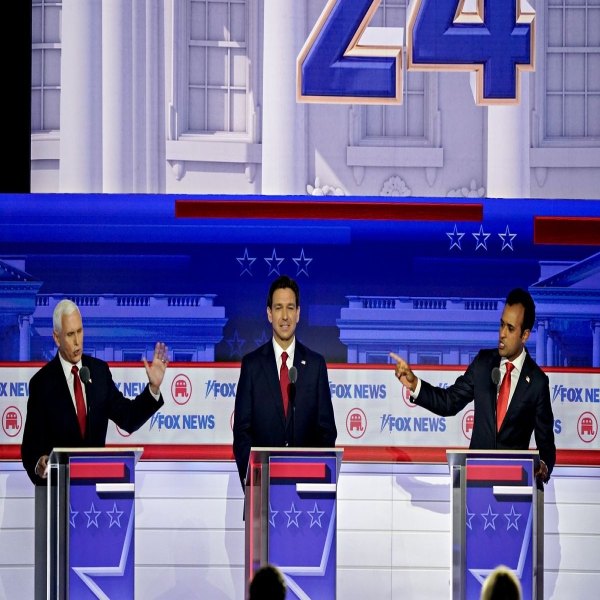“A place to make fun of what you see on TV” is less compelling than “the global town square.” But it’s more accurate.

Peter Kafka covers media and technology, and their intersection, at Vox. Many of his stories can be found in his Kafka on Media newsletter, and he also hosts the Recode Media podcast.
Wednesday night’s Republican presidential debate also had a meta contest: Who would win the fight between traditional TV — in this case, Fox News, which broadcast the debate — and Twitter, which counterprogrammed the debate with a conversation between Donald Trump and Tucker Carlson, the former Fox star-turned-Twitter streamer?
This morning, I’m declaring a winner: Twitter*. And also a loser: Twitter.
To tease that out: Carlson’s Trump interview was a zero-impact snooze, no matter what Twitter’s dubious metrics report (more on that in a minute). But Twitter was also the place to showcase what Twitter does best, even under Elon Musk’s ownership: provide a place for people to comment, in real time, about a news event. Which in this case was the TV debate.
For evidence, consult your own Twitter feed and scroll back to last night. Your Twitter may not look like my Twitter on a normal day, but I’m confident that in this case it’s going to look mighty similar. I saw Twitter users doing what they’ve always done on Twitter when there’s a news event or an awards show or a big game: annotating the thing in real time, whether that means cracking wise or hooting in derision or whatever.
The delay of him trying to smile is insane???
pic.twitter.com/FLscPB9msI
— Keith Edwards (@keithedwards) August 24, 2023
I feel bad for DeSantis having to stand next to Vivek…look at his annoying little hand! pic.twitter.com/6d7lNnCgFr
— Brent Scher (@BrentScher) August 24, 2023
That focus extended to Joe Biden’s campaign, which weighed in on the debate but not on Trump/Carlson:
What she said. pic.twitter.com/GvDRWUI1hK
— Joe Biden (@JoeBiden) August 24, 2023
And, most tellingly, it extended to Musk, who dutifully tweeted out links to the Trump interview on his own site (remember that one part of Musk’s fantasy is that Twitter becomes the world’s biggest media platform) but then found himself weighing in on the TV debate, just like everyone else:
Vivek is increasingly compelling
— Elon Musk (@elonmusk) August 24, 2023
He was impressive
— Elon Musk (@elonmusk) August 24, 2023
In retrospect, it’s easy to understand why the RNC spectacle was better than the Trump/Carlson spectacle for Twitter’s remaining users. You truly didn’t know what would happen in Milwaukee, and it featured novelties most people hadn’t seen before, like biotech guy-turned-MAGA fan Vivek Ramaswamy annoying everyone else on the stage.
And even if you didn’t know that the Trump-Carlson interview had been pre-taped — you’d have to be a close reader of prewrites from the New York Times or the Washington Post to figure that out — one quick look at the Carlson interview would tell you that it was going to be weird but that Trump was also not going to be at his most compelling — that is, when he is in front of a crowd, ad-libbing and egging them on.
Wait a minute. Didn’t Musk also point out that the Carlson/Trump conversation had one gazillion views? Sure. And while we haven’t yet seen the Nielsen numbers from last night’s RNC debate, they’re certainly going to be lower than what we saw from the numbers those debates generated in 2015 and 2016, when Trump was the novelty.
But when those numbers do come out, remember that the TV ratings Nielsen reports have no correlation to the viewership numbers Twitter is reporting. For starters, as always, Nielsen is reporting the average viewership the debates generated, not the total number of views, which is what online outlets generally report. That’s not a new discrepancy, and at this point everyone in tech and media should know better but either doesn’t or pretends not to.
More important, under Musk, Twitter has moved to an even more fanciful description of “viewership,” where it’s not even pretending to count people who watch the video. Instead, it’s simply measuring the number of times someone has seen the tweet with the video scroll through their feed, as the Washington Post’s Will Oremus reports.
But it’s pointless to spend time fact-checking Elon Musk’s Twitter claims at this point. It’s more useful to evaluate how the platform actually works. And here, there’s good news for Musk: Even after nearly a year spent trying to destroy his $44 billion impulse purchase, there’s still enough muscle memory for enough of his users that they can snap into place without a prompt.
If there’s something compelling on TV, people will want to talk about it on Twitter. Even in 2023.
* Yes, Musk now wants us to call Twitter “X,” but everybody still calls it Twitter so that’s what I’m going with here.
Source: vox.com






